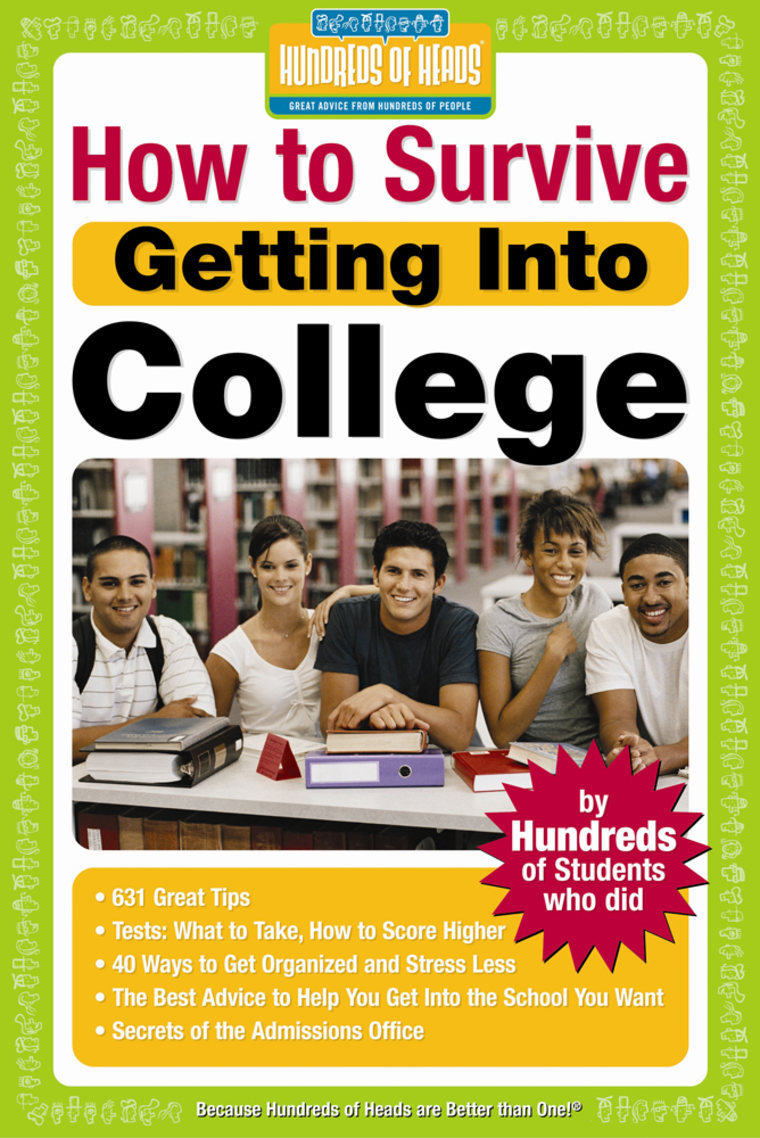More than two million U.S. high school students will apply to college this year. Getting into college has become a national obsession among teens and their parents, and it’s only getting more stressful and competitive as colleges review more applications, raise tuitions, and set tougher admission standards. “How to Survive Getting Into College,” edited by Rachel Korn, a former Ivy League college admissions officer, offers real-world tips from hundreds of former high school seniors. Korn was invited on “Today” to discuss her findings. Here is some advice covered in the book:
In “How to Survive Getting Into College,” the book’s editor, Rachel Korn, points out that the applicant should know what colleges are looking for. She says admissions officers focus on three important factors in students’ applications:
- A genuine feel for the applicant's personality. This emerges in essays, recommendations, interviews, and activities which admissions officers put together like a puzzle. You can showcase who you are in your essays and in the activities you list in order of those most important to you.
- A contribution to the school. What will the applicant add to the academic or social profile of their class? High grades and testing? Stardom in music? Campus leadership? Excellence in athletics? Geographic diversity? Or is the student just a "good kid" who will be loved?
- A big fish in the pond — any pond. This is all about context — is the applicant maximizing their environment and their talents? Admissions officers know who has resources and who does not, and applicants are evaluated in the context of their high school and their environment.
Korn, points out that an applicant can never know too much about their target schools. She says:
- Research, research, research. Through the school’s website and/or a college tour, learn as much as possible about the school’s academic and cultural atmosphere. Knowledge about the university will prepare the applicant to sit down and successfully complete the application. A passion for a school will tend to come out naturally if the student has really done his or her homework.
- Tailor the application to the school — know the characteristics it values. Convey through essays how the school “matches” the student. Listen to admissions officers' presentations and glean from reading school materials if there are initiatives (especially new ones) that should be mentioned.
- Let college counselor and teachers know about you top choice and why. They can reflect that in their letters to bolster the student’s sincerity to the admissions committee. Do not attempt this with a school that is not a favorite. Admissions officers will figure it out.
Equally important, Korn shares some of the top mistakes students make in applying to schools:
- Failure to research. Apply only to schools where there is a match with interests (size, academics, culture). It is wasted time to apply to a school for its name only. Honestly ask whether you can see yourself at the school to which you are applying. Reasoned applications are the most successful because they are the most genuine and strong - admissions officers can feel this throughout the application.
- Seeking a "big name" for a recommendation and thinking that this is the ticket into a school. Recommenders who know the student best are those to choose. A fancy title is not impressive if the recommender does not know the person. Admissions officers can sense this easily. Extra recommendations are only helpful if they present new and different information. Without the academics or the profile the school seeks, an extra recommendation rarely makes any impact.
- Using public Web sites to try to predict chances of admissions or to learn about a school. No one can predict chances of admission, certainly not peers who see nothing more than lists of grades and activities. Ask the professionals (admissions officers) and go to the schools' websites to learn accurate information and data about specific schools.
- Making the application process harder than it is! Schools want to see the student. Trying to be someone else is a waste of time and will be counter productive. It makes the student appear bland in the application. At the end of the day, the class must be created, yet institutional needs change each year. A student should be him or herself to stand out.
Here are the top 10 tips for acing the college admissions process — and getting into the college of your dreams
- Apply to about five or six schools with a few true safety schools (including at least one public school) and a few reach schools.
- Write an essay that shows what makes you tick — do not write an essay that you think an admissions committee wants to read.
- Ask questions of your interviewer — the interview is a two-way street and you should approach the interview as a conversation.
- Find positive, true passions to fill your time — there is no "right" activity, so choose a passion not an obvious resume builder.
- Dress to casually impress when you visit schools — you never know, you could meet your admissions officer.
- Craft truthful applications — admissions officers are great detectives and can spot exaggeration and insincerity.
- Apply for financial aid even if you think you may not qualify — schools consider more factors than you realize.
- Work hard through the end of senior year — these grades can be critical for admissions so do not jeopardize your application.
- Ask admissions officers your questions about their schools — public Web sites are full of misinformation.
- Remember that the goal of this journey is to find the school where you can be yourself and thrive.

Information was excerpted from "How to Survive Getting Into College" edited by Rachel Korn. Copyright © 2006, Hundreds of Heads Books, LLC. All rights reserved. Published by No part of this excerpt can be used without permission of the publisher.